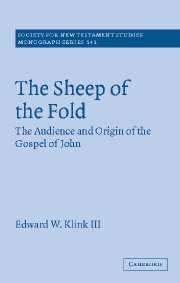Book contents
- Frontmatter
- Contents
- Acknowledgments
- List of abbreviations
- 1 The audience and origin of the Gospels: introduction and method
- 2 Early Christian community: a study of the community construct and its functional potential in early Christianity
- 3 Early Christian Gospel: Gospel genre and a critique of the two-level reading of the Gospel of John
- 4 Early Christian reader: an explication of the audience of the fourth Gospel by inquiring for the implied reader
- 5 Reading the fourth Gospel: the function of the Gospel of John in light of the Gospel community debate
- 6 The sheep of the fold: summary and conclusion
- Bibliography
- Index
3 - Early Christian Gospel: Gospel genre and a critique of the two-level reading of the Gospel of John
Published online by Cambridge University Press: 22 September 2009
- Frontmatter
- Contents
- Acknowledgments
- List of abbreviations
- 1 The audience and origin of the Gospels: introduction and method
- 2 Early Christian community: a study of the community construct and its functional potential in early Christianity
- 3 Early Christian Gospel: Gospel genre and a critique of the two-level reading of the Gospel of John
- 4 Early Christian reader: an explication of the audience of the fourth Gospel by inquiring for the implied reader
- 5 Reading the fourth Gospel: the function of the Gospel of John in light of the Gospel community debate
- 6 The sheep of the fold: summary and conclusion
- Bibliography
- Index
Summary
No discussion of the interpretation of the Gospels can avoid discussing the Gospels as text. But the text does not exist in isolation; the Gospels were created in a social and religious milieu. For the form critic, the social environment controlled the literary creation and influenced the meaning of the text. Form criticism was sociological in its very nature and literary genre was considered a social category of communication. But as we have seen thus far, it is difficult to derive the socio-historical background of the Gospels. Not only can the sociological background only be determined in vague ways, but the text itself must be considered as its own living entity. This is stated most clearly by the social historian Abraham Malherbe:
Our major sources for the social reconstruction of early Christianity are literary. We may expect to gain insights elsewhere — for example, from archeological data and modern social theory; but eventually we are driven back to literary sources. With that in mind we must stress the obvious, namely that sociological study of early Christianity cannot slight literary criticism. We must persist in seeking to determine the character and intention of different types of literature if we hope to discern how they functioned in relation to the communities with which they were associated. When that is done they can more properly be assessed as witnesses to particular communities.
- Type
- Chapter
- Information
- The Sheep of the FoldThe Audience and Origin of the Gospel of John, pp. 107 - 151Publisher: Cambridge University PressPrint publication year: 2007



